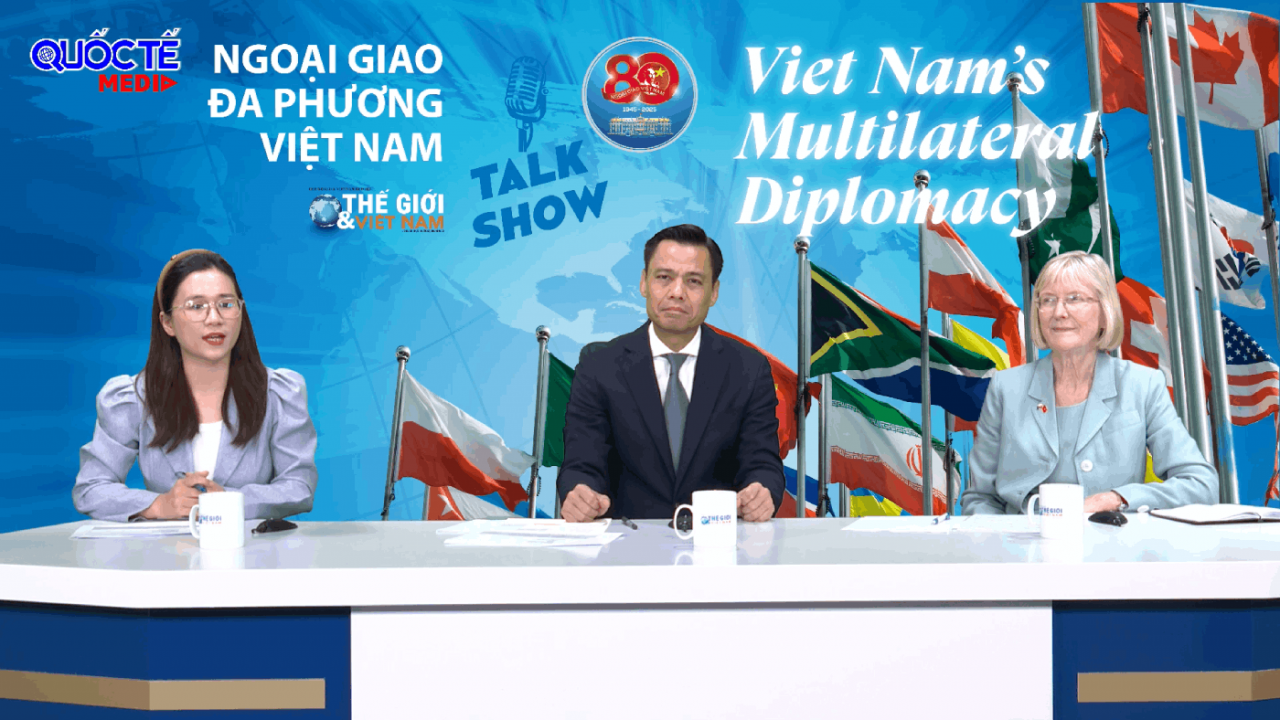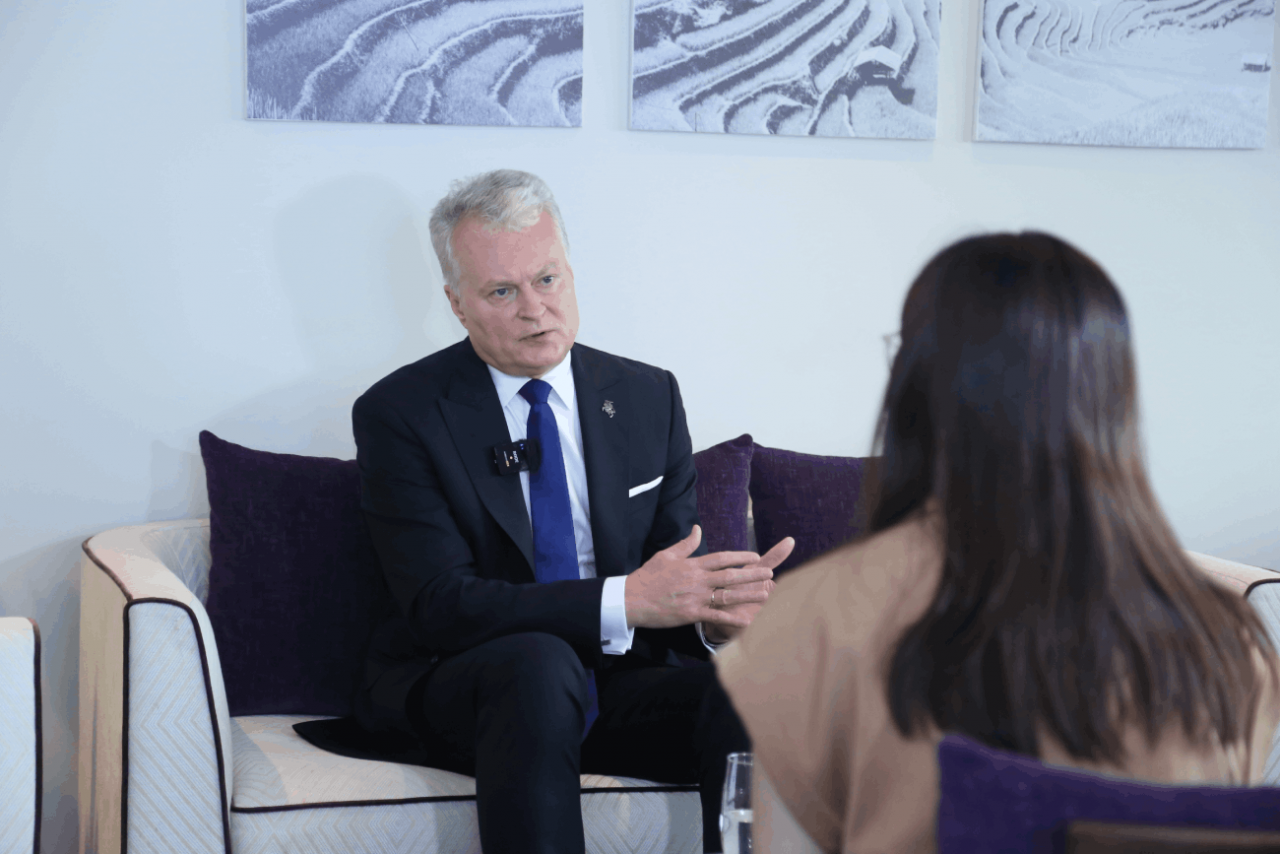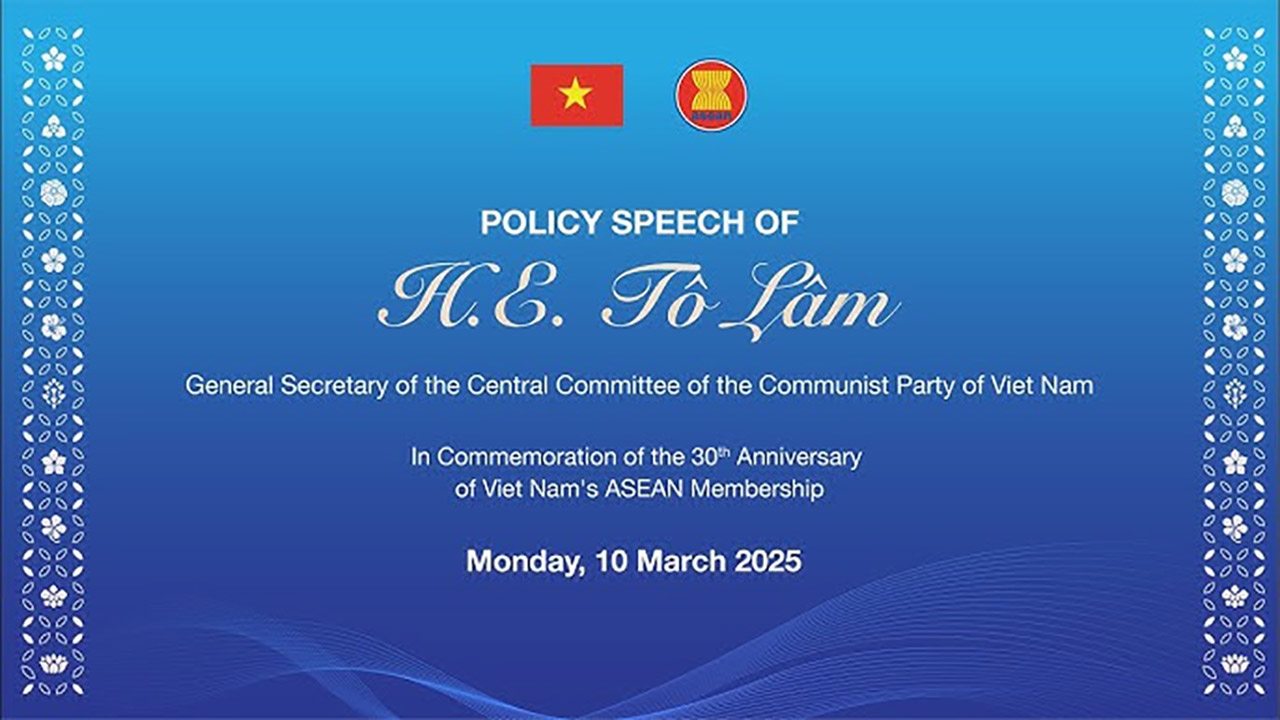
Vietnam and Netherlands transform shared objectives into concrete action: Ambassador Kees van Baar
Latest
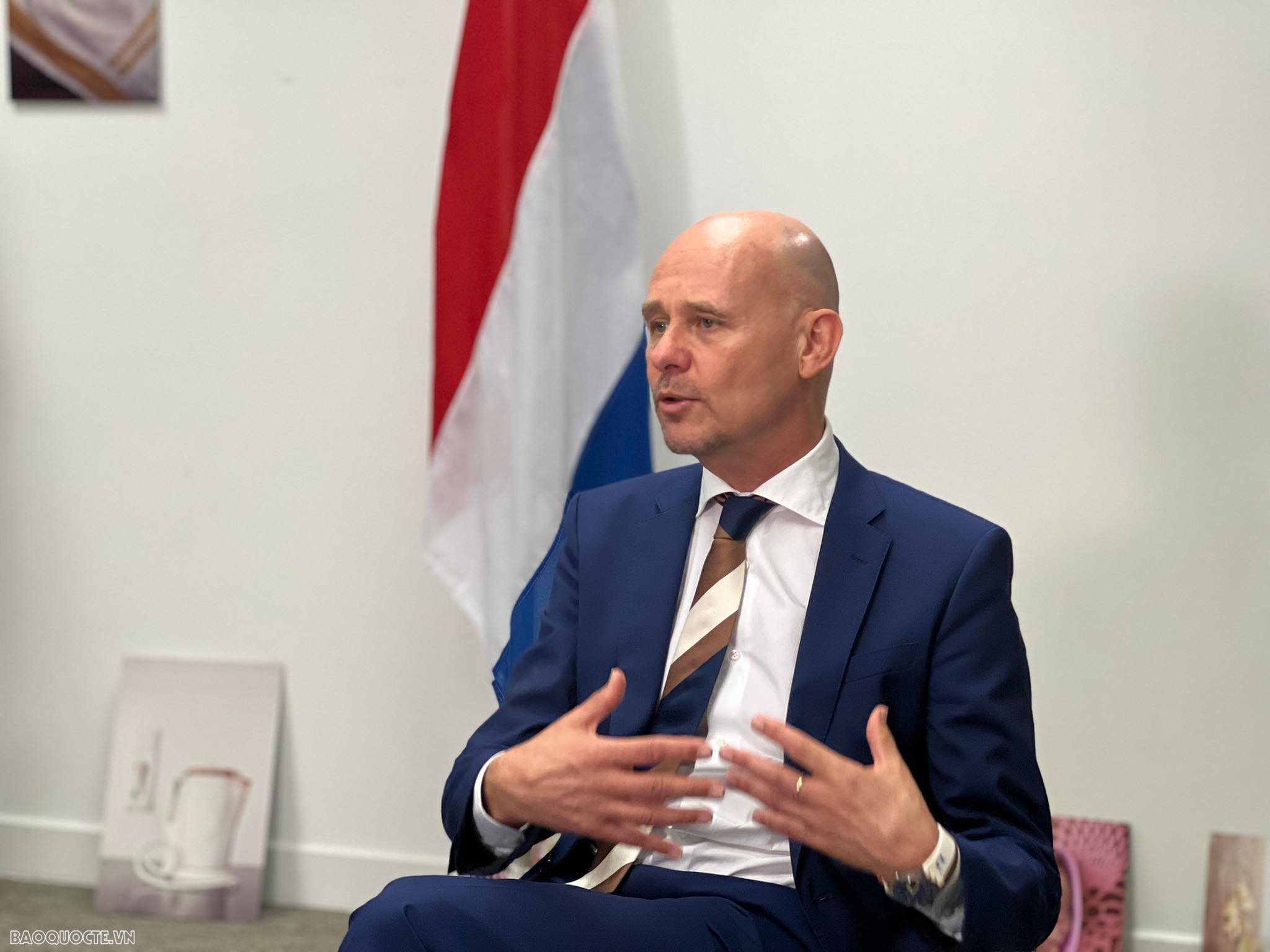 |
| Dutch Ambassador to Vietnam Kees van Baar. (Photo: Thu Trang) |
Dutch Ambassador to Vietnam Kees van Baar shared this perspective with The World and Vietnam Report in an interview on the occasion of the 4th Partnership for Green Growth and the Global Goals 2030 (P4G) Summit.
What are your comments on the significance of the 4th P4G Summit 2025 in the current context?
As we confront the escalating challenges of climate change across our interconnected world, initiatives like the Partnership for Green Growth and the Global Goals 2030 (P4G) represent not just opportunity, but necessity. This innovative platform bridges the gap between ambitious climate commitments and practical implementation of both the Paris Agreement and the UN Sustainable Development Goals. The Netherlands joined P4G as a country partner and core donor in 2018 and launched its National Platform in 2020.
What distinguishes P4G from other climate initiatives is its deliberate focus on public-private partnerships and cooperation. The summit brings together national governments, business leaders, and civil society organizations to develop market-based solutions across five strategic sectors: food and agriculture, water, energy, cities, and circular economy. This multi-stakeholder approach enables a more comprehensive and effective response to climate challenges than government action alone could achieve. The Dutch private sector is proudly and actively contributing to these five strategic sectors in Vietnam, bringing valuable expertise and scalable solutions to the table.
Vietnam's embrace of P4G principles demonstrates the kind of forward-thinking mindset we need right now. Through its innovative public-private partnership model, P4G creates tangible pathways for countries like Vietnam to leapfrog carbon-intensive development phases, which the Netherlands and many other European countries have struggled through.
The Netherlands is keen on strengthening its collaboration with Vietnam through the P4G framework—not only by offering the suitable instruments and resources, but also by sharing technical expertise and policy experience. This includes forging stronger ties between Vietnamese and Dutch companies, many of whom are already pioneering and showcasing sustainable solutions in sectors like water management, agriculture and circular economy. This is of great relevance to Vietnam: a rapidly developing economy, yet one that is deeply vulnerable to climate change. That makes it a critical partner, and a potential model for other countries navigating similar transitions.
I believe P4G gives us the tools and partnerships to turn our shared ambitions into action—and that, more than anything, is what the world needs now.
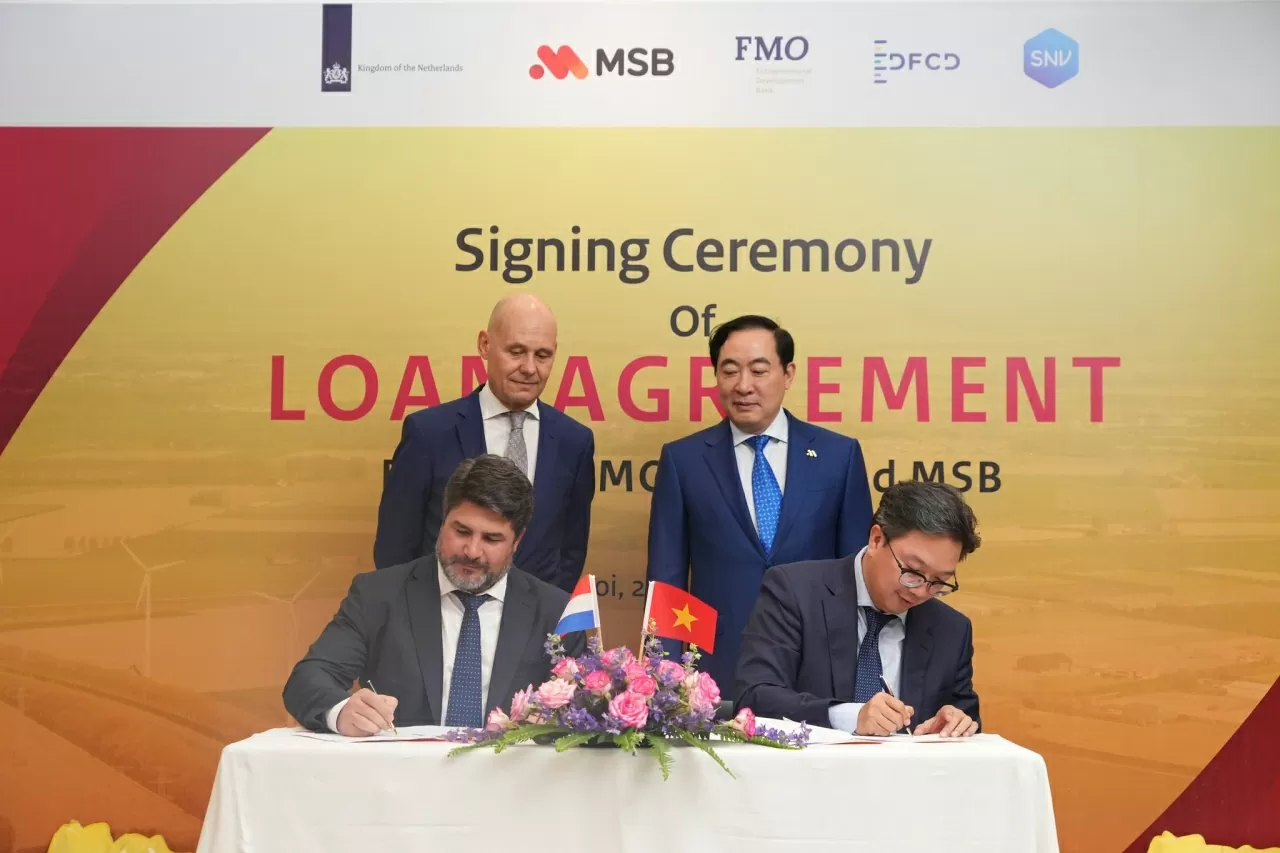 |
| Signing ceremony of the agreement on providing finance and technical support for green projects between Vietnamese and Dutch partners on January 23, 2025. (Source: Dutch Embassy in Vietnam) |
Could you please assess the theme of the 2025 P4G Summit proposed by Vietnam - “Sustainable and People-Centered Green Transition”?
Vietnam’s proposed theme for the 2025 P4G Summit—“Sustainable and People-Centred Green Transition”—is both timely and forward-looking. It highlights a fundamental truth that must underpin global climate efforts: that successful green transitions are not just about reducing emissions or transforming economies—they must also place human welfare, social justice, and inclusivity at their core.
What I find especially powerful about the theme is the emphasis on being people-centred. That simple phrase challenges us to think harder about equity, justice, and inclusive development—questions we in Europe have had to face in our own climate journeys, and which we continue to grapple with today.
For the Netherlands, this theme resonates deeply with how we translate our ambitions for green growth into collaborative policies and actions grounded in collaboration across all sectors—what we call the Dutch Diamond approach. It’s about bringing together government, business, social organisations, and knowledge institutions to jointly shape solutions. By listening to all voices and balancing the interests of each and every stakeholder, we can iron out challenges, and make sure no one is left behind during this important transition. It’s not always easy, but it’s a model that works—and that aligns closely with the spirit of this year’s Summit and the work of P4G in general.
I also see a strong connection with what CPV General Secretary Mr. To Lam has emphasised on the vital role of the private sector in shaping the country’s sustainable economic future. His recognition of the crucial role of the small and medium-sized enterprises (SMEs) in the structure of the economy, and that the sector must be developed on a sustainable foundation, with ethical business practices and social responsibility are fully aligned with the values embedded in this Summit theme. This also includes the need to invest in a so-called green workforce, ensuring that people have the skills, training and opportunities to actively take part in and benefit from the green transition.
As we look ahead to the 2025 P4G Summit, I believe Vietnam’s theme offers us all a moment to reflect: that our climate ambitions will only be truly successful if they advance human dignity alongside planetary health. The Netherlands is ready to be part of that conversation, and part of the solution with our experience, expertise and shared vision.
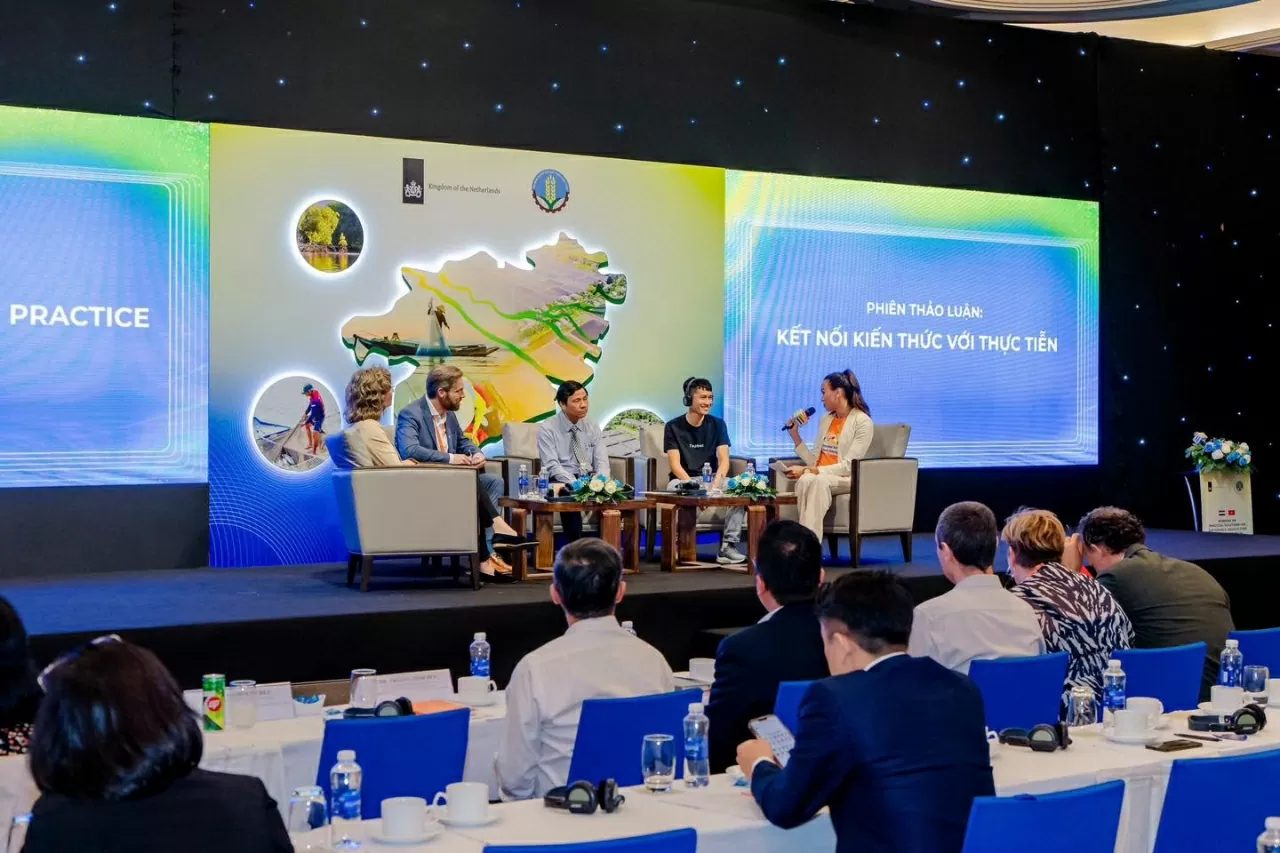 |
| The Business Forum "Vietnam - the Netherlands Working on Practical Solutions for Sustainable Aquaculture in the Mekong Delta" took place in Can Tho, on November 27, 2024. (Source: Dutch Embassy in Vietnam) |
What are the outstanding achievements of the Vietnam-Netherlands cooperation in the green transition process?
The Netherlands’ commitment to supporting Vietnam’s green transition has been strong and steady for decades. Over the years, we’ve seen active engagement from Dutch businesses, research institutions, social organisations, and civil-led initiatives across multiple sectors. This reflects our long-term strategic approach—one based on genuine partnership, mutual learning, and a shared ambition for inclusive and sustainable growth.
Vietnam is currently navigating a challenging global trade landscape. With growing pressure from some of its major international markets, it’s now time to flexibly diversify—both in terms of trading partners and export products. The EU presents a significant opportunity. It’s a large and attractive market, and Vietnam has already been strengthening ties through the EU–Vietnam Free Trade Agreement (EVFTA). The EU's demand for high-quality agricultural products—such as coffee, seafood, and rice—and electronics is strong, and these are sectors where Vietnam truly excels. However, success in the EU also means that Vietnamese producers and exporters must meet high standards around quality and sustainability, including a clear understanding of, and compliance with, EU regulations.
Supporting Vietnam’s international trade integration is one of our top priorities. For example, through the Ready2Export programme, we’ve provided tailor-made, hands-on training to help Vietnamese SMEs—particularly in agriculture, textiles, and manufacturing—adapt to major EU policies such as the Carbon Border Adjustment Mechanism (CBAM), the Corporate Sustainability Due Diligence Directive (CSDDD), and the EU Deforestation Regulation (EUDR). Once again, understanding and working towards compliance with these directives is absolutely crucial for Vietnamese businesses to unlock new export opportunities.
In agriculture, Vietnam and the Netherlands are also working closely together to prepare Vietnamese agricultural exports—particularly in the coffee sector—for compliance with the EUDR, with the Netherlands being a key EU stakeholder in this area.
Another standout achievement is our cooperation in the Mekong Delta, where both countries are jointly advancing sustainable aquaculture development. It’s a deeply integrated approach: improving farming methods, strengthening value chains, managing water resources, and adopting nature-based solutions. This also includes joint work on groundwater management and salinization, issues that are critical for the long-term viability of the delta. We’re combining Dutch expertise in integrated water resource management with Vietnam’s local knowledge to reduce subsidence and salt intrusion.
We’re also collaborating on coastal protection, an area where the Netherlands brings decades of experience in designing nature-based and hybrid solutions to protect vulnerable shorelines. Urban climate resilience is another growing focus, with both countries working to strengthen flood resilience in rapidly growing cities like Ho Chi Minh City through smart infrastructure planning and adaptive design.
In wastewater management, Dutch water technology is being applied to improve treatment systems, reduce environmental impacts, and recover valuable resources. These innovations are not only improving water quality but also contributing to circular economy goals in urban and industrial areas.
What’s especially meaningful here is how we’re building public–private partnerships and combining them with knowledge exchange and vocational training, together creating impact on the ground and real value for local communities.
These aren’t just examples of good bilateral cooperation—they’re proof of what we can truly achieve when we work together with a clear, people-centred vision for the green transition. And I’m genuinely excited to see even more tangible results from our cooperation on the ground in the time ahead.
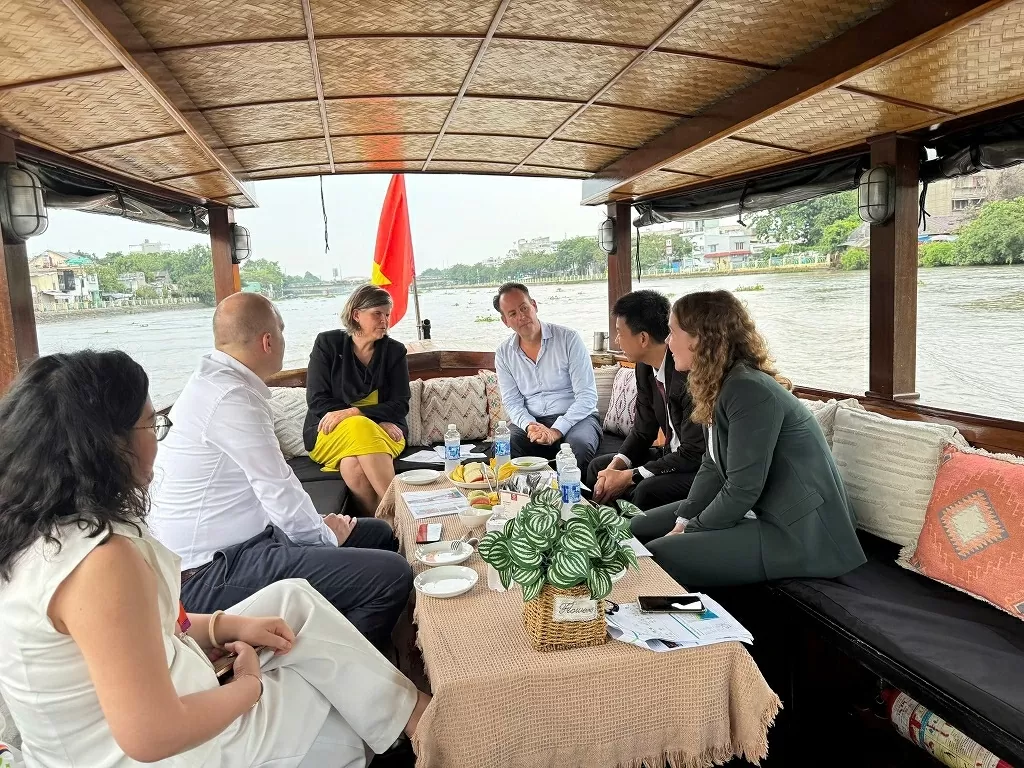 |
| Ms. Meike van Ginneken, Dutch Water Envoy during her visit to Vietnam in November, 2024. (Source: Dutch Embassy in Vietnam) |
Could you share Netherlands’s best practices and policies in promoting climate change mitigation, renewable energy with inclusive, people-centered approaches?
The Netherlands has long been recognised globally for our leadership in promoting long-term climate strategies, with a strong focus on both climate mitigation and adaptation. Our strategic contributions and leadership on climate action and sustainable development have strengthened the P4G network worldwide by facilitating knowledge-sharing of Dutch private and public sector expertise in developing countries.
This commitment to green solutions within the P4G framework can be seen in our contributions in various countries and locations in the fields. For example in ASEAN, from 2018-2022, P4G’s focus on circular economy projects enabled the Netherlands to support Indonesia with two Plastics in Circles projects: the Smart Waste Collective and Recycle 2 Value, which provide integrated waste management and plastic recycling. In Africa, a project named SokoLink in Kenya connects Kenyan avocado farmers with international markets through Dutch venture builder Enviu, providing sustainable farming training and implements digital traceability systems that enable premium pricing. The farmers have experienced 45-60% income increases while adopting climate-smart practices that reduce environmental impact.
These partnerships exemplify P4G's approach of creating market-based solutions that simultaneously advance climate goals and economic development by aligning financial incentives with environmental outcomes. These initiatives are directly relevant to Vietnam's current challenges, particularly in sustainable agriculture and clean energy access.
One of the Netherlands' most effective best practices in climate diplomacy, particularly relevant to Vietnam, lies in its commitment to long-term partnerships that combine technical expertise, policy support, and inclusive governance. It highlights the importance of tailoring Dutch climate action to partner countries’ needs through sustained bilateral engagement and multi-stakeholder platforms. In Vietnam, this has translated into integrated water resource management and coastal protection strategies that reflect Dutch expertise in adaptive delta management, while also ensuring that local communities, including women and vulnerable groups, are actively involved in planning and implementation. By embedding climate action into broader sustainable development, and aligning this with Vietnam’s own ambitions for renewable energy and climate resilience, the Netherlands promotes a model where mitigation and adaptation efforts go hand-in-hand with inclusive, people-centred approaches.
With Vietnam hosting the edition of P4G, I strongly believe there is significant potential to establish new partnerships that build on both Dutch and Vietnamese expertise. These partnerships can leverage private-sector solutions and knowledge-sharing to address Vietnam’s specific environmental and economic priorities.
The people-centred approach—including engagement with local authorities, experts, and communities—not only enhances ownership and sustainability, but also helps Vietnam navigate complex challenges in climate mitigation, renewable energy, and urban resilience, especially in vulnerable delta regions.
Thank you, Ambassador!













